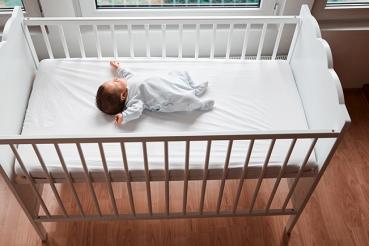Whether it's your newborn who hasn't yet learned days from nights or your teen who texts well into the wee hours, almost all kids sometimes have trouble sleeping — and as a result, so do their parents.
The 2014 Sleep in America Poll found that more than 90 percent of parents of school-age children appreciate the importance of sleep for their own and their child's well-being. Even so, almost 25 percent of parents say their child gets an hour less sleep than they need on school nights.
"If the child doesn't sleep, the whole family doesn't sleep," says Pallavi Patwari, MD, a pediatric sleep medicine specialist at Rush University Medical Center. "Sleep is important for everyone, and when considering children, the concern is that inadequate sleep can significantly affect their behavior and development."
How much sleep is enough for kids?
Each age and stage requires different amounts of sleep for optimal health. The National Sleep Foundation recommends the following hours of sleep:
- 14 to 17 for newborns
- 12 to 15 for infants
- 11 to 14 for toddlers
- 10 to 13 for preschoolers
- 9 to 11 for school-aged kids
- 8 to 10 for teenagers.
Helping your kids get their zzz's
Creating good sleep habits — also known as sleep hygiene — will help everyone rest easier and be healthier. Here, Patwari offers these tips.
1. Be consistent.
Other than newborns and infants, everyone at every age needs to keep a consistent schedule to get the most restful sleep.
"Keeping the same time to wake up and the same bedtime each night helps the body's internal clock stay on schedule," Patwari says.
Even on weekends, bedtimes and wake times shouldn't vary by more than an hour.
2. Soak up the sunshine.
"Just seeing sunshine in the morning helps keep your body's internal clock on track," Patwari adds.
However, at bedtime, keep your child's room dark to encourage sleep. Consider using light-blocking shades to keep early morning sunshine out of their room to help avoid early wake-up calls.
3. Don't be afraid to nap.
For infants and toddlers, daytime naps are essential. As they get older, though, their naps will change — what time, how often and how long. Most children no longer need a daytime nap by kindergarten, but naps can still help anyone get through the day.
For teens (and parents), an early afternoon nap of about 30 minutes can help recharge without affecting overnight sleep.
Keeping the same time to wake up and the same bedtime each night helps the body's internal clock stay on schedule.
4. Create a relaxing bedtime routine.
About an hour or so before bedtime, gradually slow things down (reduce the amount of stimulation). Encourage your child to have a healthy snack or a bottle, then play quietly.
"Reading is a great bedtime activity," Patwari says. "If they are young, read with them."
These types of calming bedtime activities become "sleep cues," a practice that helps your child become relaxed and comfortable in bed.
5. Make adjustments based on your family circumstances.
Sometimes mom or dad works a late shift, and the children want to stay up to see them.
"There is a social aspect to sleeping — and not sleeping. We all want to be awake when everyone else is awake," Patwari says. "Bedtime and wake up hours might be different for some families. Create sleep strategies to work through your family's circumstances and adjust when the schedules change."
It's also important to keep the same sleep routine even if there are different people caring for the child.
6. Banish screens close to bedtime.
The National Sleep Foundation recommends turning off all televisions, computers and smartphones — theirs and yours — at least 1 hour before bedtime. While a child may seem calm watching TV, the blue light can impact a person's ability to fall asleep.
Electronics can even shorten the amount of time kids sleep. "Texting is a big part of our culture now, and many teens will check their phones in the middle of the night," Patwari says.
If your teen or preteen is falling asleep at school or showing signs daytime sleepiness, make an agreement that phones are turned off at bedtime and, if possible, put in another room until morning.
7. Get enough exercise, but not right before bedtime.
Physical activity and playtime is important for overall health, but it's best to schedule exercise before dinnertime.
Evening sports classes or team practices can make it harder to fall asleep, gearing the body up instead of slowing things down; that's why the general recommendation is to avoid physical activity within three to four hours of lights out.
8. Kick the caffeine.
Energy drinks, soda, flavored coffee drinks and chocolate are extremely popular among tweens and teens, but all that caffeine can take a toll on kids' sleep.
The 2014 Sleep in America Poll found that when parents enforce rules about caffeine intake, children sleep almost a full hour longer.
9. Make sure babies sleep safely.
To prevent sudden infant death syndrome, or SIDS, the American Academy of Pediatrics advises putting babies to sleep on their backs on a firm surface that doesn't have loose bedding and isn't shared with parents or others.
Breastfeeding, offering a pacifier and keeping up with vaccines can all help babies sleep more safely. Also, avoid exposing your baby to smoke, and don't overdress them at night to avoid overheating.
When to get help
While nearly everyone has an occasional tough night's sleep, consistently difficult nights should be reported to your child's pediatrician.
Warning signs for possible sleep disorder include the following:
- Snoring or difficulty breathing at night
- Inappropriate daytime sleepiness or long sleep duration
- Difficulty falling asleep or staying asleep
- Change in mood with increased irritability, inattention, and/or falling grades
- Unexpected movements or behaviors during sleep
If your child is showing any of these warning signs, discuss their sleep issues with their pediatrician, who may send the child to a pediatric sleep specialist.




